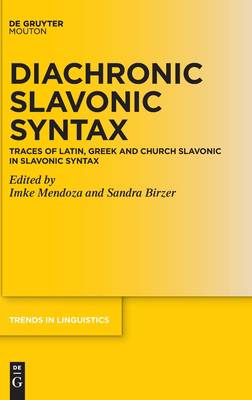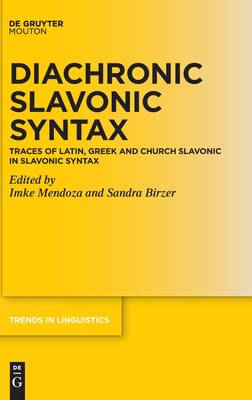
Bedankt voor het vertrouwen het afgelopen jaar! Om jou te bedanken bieden we GRATIS verzending (in België) aan op alles gedurende de hele maand januari.
- Afhalen na 1 uur in een winkel met voorraad
- In januari gratis thuislevering in België
- Ruim aanbod met 7 miljoen producten
Bedankt voor het vertrouwen het afgelopen jaar! Om jou te bedanken bieden we GRATIS verzending (in België) aan op alles gedurende de hele maand januari.
- Afhalen na 1 uur in een winkel met voorraad
- In januari gratis thuislevering in België
- Ruim aanbod met 7 miljoen producten
Zoeken
Diachronic Slavonic Syntax
Traces of Latin, Greek and Church Slavonic in Slavonic Syntax
€ 233,95
+ 467 punten
Omschrijving
The impact of the ecclesiastical languages Greek, Latin and Church Slavonic on the Slavic standard languages still lacks a systematic analysis in the theoretical framework of contact linguistics. Based on corpus data, this volume offers an account in the light of "literacy language contact", i.e. contact between varieties that are used only in a written variant and only in formal registers. Latin was used as literary language in medieval Slavia Romana; Greek was the source language for Church Slavonic, which, in turn, was the literary language for many Slavonic speaking communities and thus had an enormous impact on the development of the modern Slavonic standard languages. The book offers in-depth analyses of the impact of Latin on pre-Standard Slavonic varieties, the influence of Greek on (Old) Church Slavonic and the role of Church Slavonic as a source language for Old and Modern Russian. The contributions discuss (morpho)syntactic phenomena such as non-finite clauses, relative clauses, word order, the use and function of case and tense forms. The volume addresses Slavists, General linguists and scholars of Classical Philology interested in language contact and syntactic issues.
Specificaties
Betrokkenen
- Uitgeverij:
Inhoud
- Aantal bladzijden:
- 315
- Taal:
- Engels
- Reeks:
- Reeksnummer:
- nr. 348
Eigenschappen
- Productcode (EAN):
- 9783110647068
- Verschijningsdatum:
- 4/04/2022
- Uitvoering:
- Hardcover
- Formaat:
- Genaaid
- Afmetingen:
- 156 mm x 234 mm
- Gewicht:
- 662 g

Alleen bij Standaard Boekhandel
+ 467 punten op je klantenkaart van Standaard Boekhandel
Beoordelingen
We publiceren alleen reviews die voldoen aan de voorwaarden voor reviews. Bekijk onze voorwaarden voor reviews.








